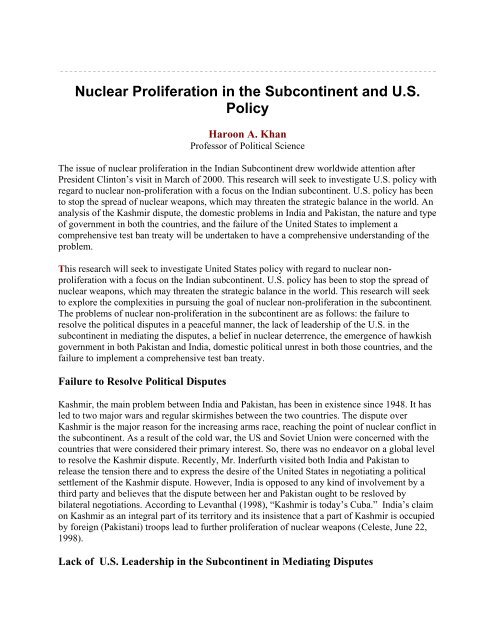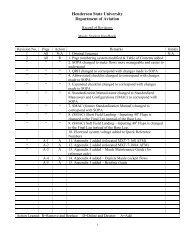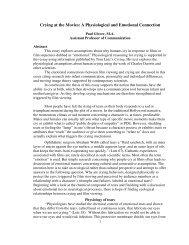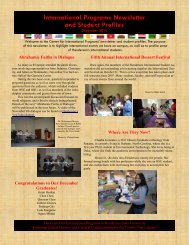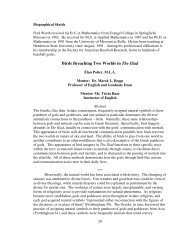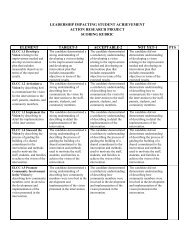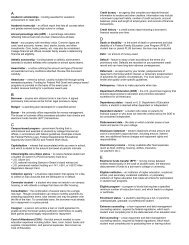Nuclear Proliferation in the Subcontinent and U.S. Policy ...
Nuclear Proliferation in the Subcontinent and U.S. Policy ...
Nuclear Proliferation in the Subcontinent and U.S. Policy ...
Create successful ePaper yourself
Turn your PDF publications into a flip-book with our unique Google optimized e-Paper software.
<strong>Nuclear</strong> <strong>Proliferation</strong> <strong>in</strong> <strong>the</strong> Subcont<strong>in</strong>ent <strong>and</strong> U.S.<br />
<strong>Policy</strong><br />
Haroon A. Khan<br />
Professor of Political Science<br />
The issue of nuclear proliferation <strong>in</strong> <strong>the</strong> Indian Subcont<strong>in</strong>ent drew worldwide attention after<br />
President Cl<strong>in</strong>ton’s visit <strong>in</strong> March of 2000. This research will seek to <strong>in</strong>vestigate U.S. policy with<br />
regard to nuclear non-proliferation with a focus on <strong>the</strong> Indian subcont<strong>in</strong>ent. U.S. policy has been<br />
to stop <strong>the</strong> spread of nuclear weapons, which may threaten <strong>the</strong> strategic balance <strong>in</strong> <strong>the</strong> world. An<br />
analysis of <strong>the</strong> Kashmir dispute, <strong>the</strong> domestic problems <strong>in</strong> India <strong>and</strong> Pakistan, <strong>the</strong> nature <strong>and</strong> type<br />
of government <strong>in</strong> both <strong>the</strong> countries, <strong>and</strong> <strong>the</strong> failure of <strong>the</strong> United States to implement a<br />
comprehensive test ban treaty will be undertaken to have a comprehensive underst<strong>and</strong><strong>in</strong>g of <strong>the</strong><br />
problem.<br />
This research will seek to <strong>in</strong>vestigate United States policy with regard to nuclear nonproliferation<br />
with a focus on <strong>the</strong> Indian subcont<strong>in</strong>ent. U.S. policy has been to stop <strong>the</strong> spread of<br />
nuclear weapons, which may threaten <strong>the</strong> strategic balance <strong>in</strong> <strong>the</strong> world. This research will seek<br />
to explore <strong>the</strong> complexities <strong>in</strong> pursu<strong>in</strong>g <strong>the</strong> goal of nuclear non-proliferation <strong>in</strong> <strong>the</strong> subcont<strong>in</strong>ent.<br />
The problems of nuclear non-proliferation <strong>in</strong> <strong>the</strong> subcont<strong>in</strong>ent are as follows: <strong>the</strong> failure to<br />
resolve <strong>the</strong> political disputes <strong>in</strong> a peaceful manner, <strong>the</strong> lack of leadership of <strong>the</strong> U.S. <strong>in</strong> <strong>the</strong><br />
subcont<strong>in</strong>ent <strong>in</strong> mediat<strong>in</strong>g <strong>the</strong> disputes, a belief <strong>in</strong> nuclear deterrence, <strong>the</strong> emergence of hawkish<br />
government <strong>in</strong> both Pakistan <strong>and</strong> India, domestic political unrest <strong>in</strong> both those countries, <strong>and</strong> <strong>the</strong><br />
failure to implement a comprehensive test ban treaty.<br />
Failure to Resolve Political Disputes<br />
Kashmir, <strong>the</strong> ma<strong>in</strong> problem between India <strong>and</strong> Pakistan, has been <strong>in</strong> existence s<strong>in</strong>ce 1948. It has<br />
led to two major wars <strong>and</strong> regular skirmishes between <strong>the</strong> two countries. The dispute over<br />
Kashmir is <strong>the</strong> major reason for <strong>the</strong> <strong>in</strong>creas<strong>in</strong>g arms race, reach<strong>in</strong>g <strong>the</strong> po<strong>in</strong>t of nuclear conflict <strong>in</strong><br />
<strong>the</strong> subcont<strong>in</strong>ent. As a result of <strong>the</strong> cold war, <strong>the</strong> US <strong>and</strong> Soviet Union were concerned with <strong>the</strong><br />
countries that were considered <strong>the</strong>ir primary <strong>in</strong>terest. So, <strong>the</strong>re was no endeavor on a global level<br />
to resolve <strong>the</strong> Kashmir dispute. Recently, Mr. Inderfurth visited both India <strong>and</strong> Pakistan to<br />
release <strong>the</strong> tension <strong>the</strong>re <strong>and</strong> to express <strong>the</strong> desire of <strong>the</strong> United States <strong>in</strong> negotiat<strong>in</strong>g a political<br />
settlement of <strong>the</strong> Kashmir dispute. However, India is opposed to any k<strong>in</strong>d of <strong>in</strong>volvement by a<br />
third party <strong>and</strong> believes that <strong>the</strong> dispute between her <strong>and</strong> Pakistan ought to be resloved by<br />
bilateral negotiations. Accord<strong>in</strong>g to Levanthal (1998), “Kashmir is today’s Cuba.” India’s claim<br />
on Kashmir as an <strong>in</strong>tegral part of its territory <strong>and</strong> its <strong>in</strong>sistence that a part of Kashmir is occupied<br />
by foreign (Pakistani) troops lead to fur<strong>the</strong>r proliferation of nuclear weapons (Celeste, June 22,<br />
1998).<br />
Lack of U.S. Leadership <strong>in</strong> <strong>the</strong> Subcont<strong>in</strong>ent <strong>in</strong> Mediat<strong>in</strong>g Disputes
The United States failed to underst<strong>and</strong> <strong>the</strong> root cause of nuclear proliferation <strong>in</strong> <strong>the</strong> subcont<strong>in</strong>ent<br />
by fail<strong>in</strong>g to provide leadership <strong>in</strong> negotiat<strong>in</strong>g between India <strong>and</strong> Pakistan to resolve <strong>the</strong> Kashmir<br />
dispute. United States policy has been sporadic dur<strong>in</strong>g <strong>the</strong> time of <strong>the</strong> cold war. The United<br />
States was content to have Pakistan as an ally <strong>and</strong> was not <strong>in</strong>terested <strong>in</strong> gett<strong>in</strong>g too <strong>in</strong>volved <strong>in</strong><br />
<strong>the</strong> subcont<strong>in</strong>ent. Moreover, <strong>the</strong> United States feared gett<strong>in</strong>g too <strong>in</strong>volved <strong>in</strong> <strong>the</strong> subcont<strong>in</strong>ent<br />
might irritate India. It was very careful not to irritate India though <strong>the</strong> latter tilted towards <strong>the</strong><br />
Soviet Union because <strong>the</strong> U.S. considered India to be an ally dur<strong>in</strong>g <strong>the</strong> period of hostilities<br />
between <strong>the</strong> United States <strong>and</strong> Ch<strong>in</strong>a until 1969. Though <strong>the</strong> U.S. considered Pakistan to be an<br />
allly aga<strong>in</strong>st Soviet aggression, U.S. policy has never been very comfortable with Pakistan<br />
because of <strong>the</strong> rule of <strong>the</strong> military, which conflicted with <strong>the</strong> American values of democracy <strong>and</strong><br />
human rights. In <strong>the</strong> 1971 war, <strong>the</strong> U.S. sided with Pakistan but failed to provide any effective<br />
support because <strong>the</strong> majority of <strong>the</strong> people of Bangladesh were <strong>in</strong> favor of <strong>in</strong>dependence. From<br />
1971 until 1979, U.S. policy <strong>in</strong> <strong>the</strong> subcont<strong>in</strong>ent was dom<strong>in</strong>ated by its general <strong>in</strong>terest of<br />
provid<strong>in</strong>g food <strong>and</strong> economic assistance, but took no active part <strong>in</strong> political disputes. Dur<strong>in</strong>g<br />
<strong>the</strong>se periods, U.S. relationship with Pakistan had been uneasy because of Pakistan’s effort <strong>in</strong><br />
develop<strong>in</strong>g nuclear weapons. U.S. policy made a significant turn <strong>in</strong> 1979 with Soviet <strong>in</strong>vasion of<br />
Afghanistan. Pakistan was considered to be a frontl<strong>in</strong>e defense aga<strong>in</strong>st Soviet communism. The<br />
United States was ma<strong>in</strong>ly concerned about Soviet aggression <strong>and</strong> had no <strong>in</strong>terest <strong>in</strong> gett<strong>in</strong>g<br />
actively <strong>in</strong>volved <strong>in</strong> <strong>the</strong> politcs of <strong>the</strong> subcont<strong>in</strong>ent. After <strong>the</strong> withdrawl of <strong>the</strong> Soviet troops from<br />
Afghanistan, U.S. policy makers aga<strong>in</strong> put <strong>the</strong> subcont<strong>in</strong>ent on <strong>the</strong> backburner. However, with<br />
<strong>the</strong> nuclear explosions by both India <strong>and</strong> Pakistan <strong>in</strong> 1998, <strong>the</strong> subcont<strong>in</strong>et is of <strong>in</strong>terest to <strong>the</strong><br />
U.S.<br />
Domestic Unrest <strong>and</strong> <strong>the</strong> Emergence of Hawkish Governments<br />
Ano<strong>the</strong>r reason for <strong>the</strong> nuclear arms race is <strong>the</strong> problem of separatism <strong>and</strong> regionalism that<br />
characterize <strong>the</strong> politics <strong>in</strong> India <strong>and</strong> Pakistan. India faces a problem of separatism <strong>in</strong> Punjab <strong>and</strong><br />
<strong>in</strong> <strong>the</strong> Nor<strong>the</strong>ast. India is a complex society with a divergent culture <strong>and</strong> languages. The social<br />
<strong>and</strong> sectarian conflicts lead to fur<strong>the</strong>r <strong>in</strong>stability. The decay of <strong>the</strong> Congress <strong>in</strong> India has fur<strong>the</strong>r<br />
augmented <strong>the</strong> rise of fundamentalism. From a historical po<strong>in</strong>t of view, Sou<strong>the</strong>rn India<br />
ma<strong>in</strong>ta<strong>in</strong>s its separate identity from nor<strong>the</strong>rn India.<br />
Pakistan is also faced with <strong>the</strong> problem of separatism <strong>in</strong> S<strong>in</strong>d <strong>and</strong> Northwest Frontier<br />
Prov<strong>in</strong>ce. Because of regionalism <strong>and</strong> separatism, both India <strong>and</strong> Pakistan promote an arms race<br />
with <strong>the</strong> hope that <strong>the</strong> people will rally under <strong>the</strong> flag dur<strong>in</strong>g a national crisis. So, a popular<br />
slogan for <strong>the</strong> parties <strong>and</strong> politicians is an advocacy of a tougher st<strong>and</strong> towards <strong>the</strong> o<strong>the</strong>r, with<br />
<strong>the</strong> idea that people will galvanize <strong>the</strong>ir support for <strong>the</strong> party which takes a tougher st<strong>and</strong>. It has<br />
led to <strong>the</strong> victory of <strong>the</strong> hawkish parties <strong>in</strong> both India <strong>and</strong> Pakistan. With a military takeover <strong>in</strong><br />
Pakistan <strong>in</strong> October 1999, militarism <strong>and</strong> nuclear proliferation have received an added fuel.<br />
Faced with economic <strong>and</strong> political problems, <strong>the</strong> military <strong>in</strong> Pakistan found a rally<strong>in</strong>g cry <strong>in</strong><br />
nuclear weapons <strong>and</strong> conflict with India. Similarly, <strong>the</strong> rul<strong>in</strong>g Bharatiya Janata Party (BJP)<br />
emphasizes that India should never have to fear about be<strong>in</strong>g blown away by Ch<strong>in</strong>a or Pakistan.<br />
The 1998 BJP manifesto is based on economic nationalism, social harmony, H<strong>in</strong>dutva (cultural<br />
nationalism) <strong>and</strong> rais<strong>in</strong>g of India’s image <strong>in</strong> <strong>the</strong> <strong>in</strong>ternational arena. The BJP considers nuclear<br />
power as India’s glory <strong>and</strong> prestige <strong>in</strong> <strong>in</strong>ternational politics.
Failure of <strong>the</strong> U.S. to Implement <strong>Nuclear</strong> Non-<strong>Proliferation</strong><br />
Despite <strong>the</strong> nuclear non-proliferation treaty, <strong>the</strong> United States failed to enforce <strong>the</strong><br />
pr<strong>in</strong>ciple of <strong>the</strong> treaty. The nuclear non-proliferation treaty obligates <strong>the</strong> five acknowledged<br />
nuclear states (U.S., Russia, U.K., France, <strong>and</strong> Ch<strong>in</strong>a) not to transfer nuclear weapons, o<strong>the</strong>r<br />
nuclear devices, or <strong>the</strong>ir technology to any non-nuclear states. Non-nuclear states undertake not<br />
to acquire or produce nuclear weapons or nuclear explosive devices. They are also required to<br />
accept safeguards to detect diversions of nuclear materials from peaceful activities, such as<br />
power generation to <strong>the</strong> production of nuclear weapons or o<strong>the</strong>r nuclear explosive devices. The<br />
treaty was signed by <strong>the</strong> U.S., U.K., U.S.S.R., <strong>and</strong> 59 o<strong>the</strong>r countries. Ch<strong>in</strong>a jo<strong>in</strong>ed <strong>in</strong> March<br />
1992, <strong>and</strong> France jo<strong>in</strong>ed <strong>in</strong> August 1992. Over 180 non-nuclear states are now members of <strong>the</strong><br />
NPT. In 1996, Belarus jo<strong>in</strong>ed Ukra<strong>in</strong>e <strong>and</strong> Kazakstan <strong>and</strong> transferred nuclear weapons to Russia<br />
<strong>and</strong> jo<strong>in</strong>ed <strong>the</strong> NPT as non-nuclear states.<br />
The United States failed to stop <strong>the</strong> transfer of nuclear technology <strong>in</strong> <strong>the</strong> world. Moreover, many<br />
third world countries are advanc<strong>in</strong>g <strong>in</strong> technology lead<strong>in</strong>g to a dim<strong>in</strong>ished control of <strong>the</strong> western<br />
nations on <strong>the</strong> scientific technology on which <strong>the</strong>y had a monopoly. The United States also failed<br />
to prevent Ch<strong>in</strong>a from giv<strong>in</strong>g Pakistan nuclear technology. Pakistan desparately needed to<br />
develop nulear weapons to have an effective deterrance aga<strong>in</strong>st any nuclear or conventional<br />
attack by India.<br />
Congress <strong>in</strong> 1985 <strong>and</strong> 1990 blocked <strong>the</strong> sales of civilian nuclear reactors <strong>and</strong> fuel to<br />
Ch<strong>in</strong>a by requir<strong>in</strong>g <strong>the</strong> president to certify that “Ch<strong>in</strong>a has provided clear <strong>and</strong> unequivocal<br />
assurance to <strong>the</strong> United States that it is not assist<strong>in</strong>g any nonnuclear weapons states, ei<strong>the</strong>r<br />
directly or <strong>in</strong>directly <strong>in</strong> acquir<strong>in</strong>g nuclear explosive devices or <strong>the</strong> materials <strong>and</strong> components for<br />
such devices” (Levanthal 1998).<br />
As a matter of fact, <strong>the</strong> Reagan, Bush <strong>and</strong> Cl<strong>in</strong>ton adm<strong>in</strong>istrations have failed to certify<br />
Ch<strong>in</strong>a because of its assistence <strong>in</strong> develop<strong>in</strong>g nuclear devices to Algeria, Iran, Iraq <strong>and</strong> Pakistan<br />
despite <strong>the</strong> fact of Ch<strong>in</strong>a’s commitment not to do so (Levanthal 1998).<br />
Accord<strong>in</strong>g to Levanthal (1998), “India-Pakistan represent a colossal U.S. foreign policy<br />
failure <strong>and</strong> U.S. non-proliferation is <strong>in</strong> disarray.” The United States improved commercial <strong>and</strong><br />
political relations with India <strong>and</strong> Pakistan without any condition of nuclear non-proliferation.<br />
The visit by Inderfurth, Secretary of State Albright <strong>and</strong> <strong>the</strong> National Security Adviser<br />
gave <strong>the</strong> impression that nuclear differences would not st<strong>and</strong> <strong>in</strong> <strong>the</strong> way of improved US-India<br />
relationships. India used <strong>the</strong> slogan of peaceful purpose to conceal its program. Atom for peace<br />
reactor was supplied by Canada <strong>and</strong> heavy water was supplied by <strong>the</strong> United States.<br />
Pakistan has been successful <strong>in</strong> produc<strong>in</strong>g plutonium weapons with <strong>the</strong> assistance of<br />
Ch<strong>in</strong>a (Levanthal 1998). Both India <strong>and</strong> Pakistan have kept a weapons program outside of <strong>the</strong><br />
NPT <strong>and</strong> <strong>the</strong> CTBT. “600 pounds of plutonium, enough for 50 bombs, were produced <strong>in</strong> India’s<br />
Cirus <strong>Nuclear</strong> Reactor. It was an atom for peace reactor built by Canada <strong>and</strong> made operable by<br />
an essential 21 tons of heavy war supplied by <strong>the</strong> United States” (Gil<strong>in</strong>sky <strong>and</strong> Laventhal 1998).<br />
India used this reactor to explode a 1974 nuclear device for a peaceful purpose. The <strong>the</strong>n
Secretary of Defense admitted that it was a bomb all <strong>the</strong> time (ibid 1998). The United States<br />
supplied two nuclear power reactors <strong>in</strong> 1963 (Ibid, 1998). India could use American selfdeception,<br />
which derives from a mix of ideology <strong>and</strong> commercial greed. The reaction to 1974<br />
explosion was <strong>the</strong> <strong>Nuclear</strong> non-proliferation Act of 1978. But <strong>the</strong> State Department helped India<br />
to get around <strong>the</strong> law by arrang<strong>in</strong>g for France <strong>and</strong> later Ch<strong>in</strong>a to cont<strong>in</strong>ue <strong>the</strong> Tarapur fuel supply<br />
(Ibid 1998). “The 1998 tests present a def<strong>in</strong><strong>in</strong>g event <strong>in</strong> U.S. non-proliferation policy. We failed<br />
to react sharply enough to head off <strong>the</strong> Pakistani test. No po<strong>in</strong>t <strong>in</strong> try<strong>in</strong>g to engage <strong>in</strong> nuclear<br />
limitation, if we do not enforce exist<strong>in</strong>g agreements” (Ibid, 1998)<br />
“Reactors were supplied to India by Canada, <strong>and</strong> Russia. Heavy water to make <strong>the</strong> plants<br />
operable was supplied by Ch<strong>in</strong>a, Norway, Rumania, <strong>the</strong> Soviet Union <strong>and</strong> West Germany”<br />
(Dolley June, 1998). Ch<strong>in</strong>a provided Pakistan almost its entire nuclear program. Ch<strong>in</strong>a even<br />
supplied a tested nuclear bomb design to Pakistan <strong>in</strong> <strong>the</strong> early 1980s (Dolley 1998). Ch<strong>in</strong>a helped<br />
Pakistan construct <strong>the</strong> Khushab reactor. Pakistan used uranium development technology stolen<br />
from URENCO, a European consortium <strong>in</strong> <strong>the</strong> 1970. France provided reprocess<strong>in</strong>g technology<br />
<strong>and</strong> components. Germany provided tritium production technology to produce nuclear weapons.<br />
India <strong>in</strong>sists that it will jo<strong>in</strong> only as a nuclear weapon state <strong>and</strong> Pakistan <strong>in</strong>sists it will jo<strong>in</strong><br />
if India does it first. President Cl<strong>in</strong>ton ma<strong>in</strong>ta<strong>in</strong>ed that a “quantum leap <strong>in</strong> relationship with<br />
India.” He <strong>in</strong>sisted that nuclear disagreement would not dom<strong>in</strong>ate <strong>the</strong> agenda. Only a few<br />
months later India conducted its tests followed by Pakistan (Dolley June, 1998). India’s decision<br />
to test is a clear repudiation of <strong>the</strong> Cl<strong>in</strong>ton adm<strong>in</strong>istration’s nuclear nonproliferation policy. At<br />
<strong>the</strong> urg<strong>in</strong>g of <strong>the</strong> Council on Foreign Relations, President Cl<strong>in</strong>ton offered economic assistance to<br />
India, <strong>in</strong>clud<strong>in</strong>g <strong>the</strong> supply of a nuclear power plan without stipulat<strong>in</strong>g India’s cont<strong>in</strong>ued<br />
abst<strong>in</strong>ence from nuclear weapons. The NCI appeal to <strong>the</strong> Cl<strong>in</strong>ton adm<strong>in</strong>istration to dem<strong>and</strong> that<br />
Ch<strong>in</strong>a take back a large supply of heavy water that it had provided to Pakistan fell upon a deaf<br />
ear.<br />
The U.S. supplied <strong>the</strong> essential heavywater component that made <strong>the</strong> Indian Cirus reactor<br />
operable, <strong>and</strong> let Canada take <strong>the</strong> fall for <strong>the</strong> Indian test. Canada promptly cut off nuclear exports<br />
to India, but <strong>the</strong> US did not. In 1976, <strong>the</strong> Senate Committee was concerned about <strong>the</strong> U.S.<br />
exports of heavy water <strong>and</strong> questioned <strong>the</strong> State Department. The response was that <strong>the</strong> heavy<br />
water had already leaked out with a rate of 10% each year (Leavanthal 1998). But <strong>the</strong> committee<br />
learned from Canada that <strong>the</strong> actual heavy water loss is about 1% <strong>and</strong> more than 90% of <strong>the</strong> U.S.<br />
heavy water was still <strong>in</strong> <strong>the</strong> Cirus reactor even though it took a decade for India to develop <strong>the</strong><br />
nuclear device (Leavanthal 1998).<br />
The great failures <strong>in</strong> terms of nuclear non-proliferation are India <strong>and</strong> Pakistan. United<br />
States’ efforts to block Pakistan from develop<strong>in</strong>g nuclear weapons were dim<strong>in</strong>ished by <strong>the</strong> more<br />
press<strong>in</strong>g need of combat<strong>in</strong>g <strong>the</strong> Soviets <strong>in</strong> Afghanistan. United States’ efforts to curtail nuclear<br />
supply was dim<strong>in</strong>shed by <strong>the</strong> more urgent need of stopp<strong>in</strong>g Iran. The U.S. tilt towards Ch<strong>in</strong>a<br />
<strong>in</strong>clud<strong>in</strong>g <strong>the</strong> activation of <strong>the</strong> 1985 nuclear cooperation was done without any respect toward <strong>the</strong><br />
impact it would have on India. Paul Levanthal cautioned aga<strong>in</strong>st nuclear proliferation <strong>in</strong> <strong>the</strong><br />
subcont<strong>in</strong>ent. In his testimony before <strong>the</strong> House Foreign Affairs Committee on October 22, 1987,<br />
he remarked, “The prevail<strong>in</strong>g wisdom of U.S. non-proliferation over <strong>the</strong> years has been to<br />
manage is human, to prevent is div<strong>in</strong>e. Our policies toward India <strong>and</strong> Israel are clearly
management oriented.” He suggested that <strong>the</strong> U.S. could use <strong>the</strong> $4.02 billion aid package. “The<br />
legislative history of <strong>the</strong> waiver of <strong>the</strong> cut off requirements of <strong>the</strong> Glen-Sym<strong>in</strong>gton amendment<br />
provides an evidence that <strong>the</strong> U.S. is prepared to let Pakistan go far <strong>in</strong> develop<strong>in</strong>g nuclear<br />
weapon” (Levanthal 1987). The U.S. cut off aid twice <strong>and</strong> it restored twice. The U.S. cut off aid<br />
to Pakistan <strong>in</strong> response to Pakistan’s import of a reprocess<strong>in</strong>g technology from France. United<br />
States cut off aid <strong>in</strong> 1979 <strong>in</strong> response to <strong>the</strong> Sym<strong>in</strong>gton Amendment to Pakistan’s construction of<br />
an unsafeguarded enrichment plant at Kahuta us<strong>in</strong>g stolen Dutch technology (ibid 1987). In<br />
1979, US tried to reach out to Zia for his help <strong>in</strong> Afghanistan <strong>and</strong> provided a $3.2 billion aid<br />
package <strong>in</strong> 1981. Congress decided to suspend <strong>the</strong> Sym<strong>in</strong>gton Amendment with respect to<br />
Pakistan dur<strong>in</strong>g <strong>the</strong> aid period of six years. President Reagan wrote to Zia assur<strong>in</strong>g that Pakistan<br />
would not enrich uranium beyond <strong>the</strong> 5% level. In 1985 Congress passed laws to cut off aid if it<br />
found a proof of a nuclear device. The Solarz Amendment was expected to bar aid to nonnuclear<br />
weapons states seek<strong>in</strong>g illegally export nuclear item from <strong>the</strong> US.<br />
The United States backed away from enforc<strong>in</strong>g <strong>the</strong> sanction of an aid cutoff aga<strong>in</strong>st<br />
Pakistan permitt<strong>in</strong>g <strong>the</strong> waiver of <strong>the</strong> Sym<strong>in</strong>gton Amendment through legislation <strong>in</strong> 1981,<br />
waiv<strong>in</strong>g <strong>the</strong> Glen Amendment by presidential action <strong>in</strong> 1982 (Levanthal 1987).<br />
Although <strong>the</strong> Carter adm<strong>in</strong>istration agreed that <strong>the</strong> supply of nuclear fuel would br<strong>in</strong>g<br />
concessions from India <strong>in</strong> non-proliferation, <strong>the</strong> outcome was never realized (Buel 1983). On<br />
June 29, 1998, <strong>the</strong> agreement between Ch<strong>in</strong>a <strong>and</strong> <strong>the</strong> United States on peaceful use of nuclear<br />
technology was signed. The Cl<strong>in</strong>ton adm<strong>in</strong>istration lifted <strong>the</strong> 1989 embargo on nuclear exports to<br />
Ch<strong>in</strong>a after <strong>the</strong> Ch<strong>in</strong>ese Premier promised that it would not help countries like Pakistan <strong>and</strong> Iran<br />
develop nuclear weapons.<br />
Ano<strong>the</strong>r event marks a failure of U.S. effort <strong>in</strong> nuclear non-proliferation. President Cl<strong>in</strong>ton sent<br />
<strong>the</strong> Comprehensive Test Ban Treaty (CTBT) for Senate approval on September 22, 1999 but it<br />
was turned down by <strong>the</strong> Senate on October 13, 1999 by a vote of 51 aga<strong>in</strong>st to 48 <strong>in</strong> favor, far<br />
short of <strong>the</strong> two third vote needed. All but 3 of <strong>the</strong> 44 nations (India, Pakistan <strong>and</strong> North Korea)<br />
have signed <strong>the</strong> treaty. The failure of <strong>the</strong> CTBT <strong>in</strong> <strong>the</strong> Senate would make it very difficult to<br />
conv<strong>in</strong>ce o<strong>the</strong>r nations to sign <strong>the</strong> treaty on comprehensive ban <strong>and</strong> <strong>the</strong> non-proliferation treaty.<br />
The U.S. government has set up a new agency, Defense Threat Reduction Agency (DTRA). This<br />
new agency will consolidate <strong>the</strong> present agencies: On Site Inspection Agency, Defense Special<br />
Weapons Agency, <strong>and</strong> Defense Technology Security Adm<strong>in</strong>istration. This new agency will be<br />
directly responsible to <strong>the</strong> Under Secretary of Defense Acquisition <strong>and</strong> Technology (Economic<br />
Times May 25, 1998).<br />
Failure of Sanctions as a Tool to Prevent <strong>Nuclear</strong> <strong>Proliferation</strong><br />
In an <strong>in</strong>terdependent world, it is difficult to have a last<strong>in</strong>g impact of economic sanctions to<br />
modify <strong>the</strong> behavior of <strong>the</strong> nations unless <strong>the</strong>re is a coord<strong>in</strong>ated <strong>and</strong> unified effort.<br />
Cl<strong>in</strong>ton called <strong>the</strong> Indian nuclear tests a “terrible mistake,” unh<strong>in</strong>g<strong>in</strong>g security <strong>in</strong> South Asia <strong>and</strong><br />
imposed more than $20 billion worth of economic sanctions aga<strong>in</strong>st India. Japan suspended loans<br />
to India <strong>and</strong> withdrew its ambassador temporarily; India considered this as hypocrisy on <strong>the</strong> part
of <strong>the</strong> western power. Accord<strong>in</strong>g to India, it is a double st<strong>and</strong>ard for <strong>the</strong> U.S., which defies <strong>the</strong><br />
call of <strong>in</strong>ternational community to disarmament. In a world of five nuclear powers <strong>and</strong> two<br />
undeclared powers like Pakistan <strong>and</strong> Israel, India cannot avoid be<strong>in</strong>g nuclear (May 14, 1998<br />
Economic Times) In a modern world, it is difficult to have any effective impact of economic<br />
sanctions as a tool of gett<strong>in</strong>g compliance of o<strong>the</strong>r nations <strong>in</strong> nuclear non-proliferation.<br />
Bhaghwati, Professor of Economics at Columbia University remarked that <strong>the</strong> sanctions would<br />
have very little impact on India (Economic Times, May 26, 1998). Moreover, he thought it would<br />
have a beneficial effect on India by encourag<strong>in</strong>g economic <strong>in</strong>dependence.<br />
The follow<strong>in</strong>g chronological events would prove <strong>the</strong> <strong>in</strong>effectiveness of <strong>the</strong> sanctions. On May<br />
22, 1998 Former Congressman Solarz proposed that India be admitted to <strong>the</strong> nuclear club as a<br />
quid pro quo for sign<strong>in</strong>g <strong>the</strong> NPT <strong>and</strong> o<strong>the</strong>r agreements. Karl Inderfurth, Assistant Secretary of<br />
State for South Asian Affairs acknowledged <strong>the</strong> need for a new approach.<br />
France <strong>and</strong> Germany lobbied aga<strong>in</strong>st sanctions (The Economic Times, May 27). Instead<br />
of lobby<strong>in</strong>g aga<strong>in</strong>st India <strong>in</strong> <strong>the</strong> World Bank, <strong>the</strong> US decided to go for a postponement on <strong>the</strong><br />
loan to India. This came after a meet<strong>in</strong>g of <strong>the</strong> Indian ambassador <strong>and</strong> US Under Secretary of<br />
State with an assurance that India is work<strong>in</strong>g on a consensus on <strong>the</strong> issue (The Economic Times<br />
on L<strong>in</strong>e, May 27, 1998).<br />
On May 30, <strong>the</strong> British Foreign Secretary declared his plan to br<strong>in</strong>g India <strong>and</strong> Pakistan to<br />
non-proliferation agreement. He also mentioned that <strong>the</strong> poor should not suffer as a result of<br />
<strong>in</strong>ternational sanction. The U.S.-India Bus<strong>in</strong>ess Council warned <strong>the</strong> Cl<strong>in</strong>ton adm<strong>in</strong>istration about<br />
<strong>the</strong> adverse impact of sanctions on American bus<strong>in</strong>esses. “U.S. Sanctions might actually<br />
strenghten Indian government monopolies, which militates aga<strong>in</strong>st <strong>the</strong> very concept of<br />
liberlization” (The Economic Times, June 5, 1998). Foreign m<strong>in</strong>isters of <strong>the</strong> G-8 countries<br />
<strong>in</strong>formally agreed on a draft that opened ways for talks with India <strong>and</strong> Pakistan on <strong>the</strong> nuclear<br />
issue without seek<strong>in</strong>g to publicly push <strong>the</strong> countries <strong>in</strong>to a corner (The Economic Times, June11).<br />
A meet<strong>in</strong>g of <strong>the</strong> Security Council called on India <strong>and</strong> Pakistan to stop test<strong>in</strong>g nuclear weapons<br />
as well as missiles <strong>and</strong> to sign <strong>the</strong> CTBT <strong>and</strong> <strong>the</strong> non-proliferation treaty (The Economic Times,<br />
June 11, 1998). Secretary of State Albright sought flexibility <strong>in</strong> implementation of sanctions<br />
fear<strong>in</strong>g that <strong>the</strong> sanctions would hurt US bus<strong>in</strong>esses (The Economic Times, June 12). Foreign<br />
M<strong>in</strong>isters of <strong>the</strong> G-8 Countries agreed to postpone all <strong>the</strong> loans to India <strong>and</strong> Pakistan. However,<br />
<strong>the</strong>y agreed that <strong>the</strong>y were encouraged by <strong>the</strong> first signs that <strong>the</strong> two countries were ready to<br />
open a dialogue. They were encouraged by <strong>the</strong> moratorium declared by <strong>the</strong> two countries. G-8<br />
countiries emphasized that steps should be taken to open a dialogue on all issues, <strong>in</strong>clud<strong>in</strong>g<br />
Kashmir. The International Atomic Energy Agency (IAEA) endorsed India to <strong>the</strong> nuclear<br />
weapon states to engage <strong>in</strong> mean<strong>in</strong>gful disarmament as part of a global strategy to elim<strong>in</strong>ate<br />
nuclear weapons (The Economic Times, June 14, 1998).<br />
Secretary of State Albright admitted publicly that <strong>the</strong> sanctions aga<strong>in</strong>st India <strong>and</strong> Pakistan<br />
follow<strong>in</strong>g <strong>the</strong>ir tests failed miserably. She also admitted that India had deceived <strong>the</strong> United States<br />
(The Economic Times, June 17). The Under Secretary of Commerce <strong>in</strong> his testimony before a<br />
Congressional Panel on Asia <strong>and</strong> <strong>the</strong> Pacific dur<strong>in</strong>g its special hear<strong>in</strong>g on India-Pakistan <strong>Nuclear</strong><br />
Non-<strong>Proliferation</strong> said, “While it is doubtful <strong>the</strong> sanctions will cripple India’s economy, <strong>the</strong>y<br />
would never<strong>the</strong>less dim<strong>in</strong>ish <strong>the</strong> ability of US companies to pursue projects <strong>in</strong> India <strong>and</strong> block
new f<strong>in</strong>anc<strong>in</strong>g by <strong>in</strong>ternational f<strong>in</strong>ancial <strong>in</strong>stitutions” (The Economic Times, June 17, 1998). He<br />
said, “Our approach has been to implement sanctions <strong>in</strong> a way that is not likely to <strong>in</strong>fluence <strong>the</strong><br />
affected governments, while m<strong>in</strong>imiz<strong>in</strong>g to <strong>the</strong> extent possible <strong>the</strong> impact of US bus<strong>in</strong>ess, <strong>and</strong><br />
labor <strong>and</strong> <strong>the</strong> populations of <strong>the</strong>se countries (The Economic Times, June 17). Karl Inderfurth<br />
said, “Sanctions aga<strong>in</strong>st India <strong>and</strong> Pakistan will not take <strong>the</strong> US very far as it needs to take note<br />
of India’s concern if <strong>the</strong> current South Asia crisis has to be restored.” (The Economic Times,<br />
June 20). President Cl<strong>in</strong>ton on June 20 expressed his disenchantment with U.S. sanctions<br />
policy. Under Secretary of Treasury David Lipton stated that <strong>the</strong> banks would not be barred from<br />
do<strong>in</strong>g bus<strong>in</strong>ess. The loans relat<strong>in</strong>g to education, maternal <strong>and</strong> child health, water, sewage, low<br />
<strong>in</strong>come hous<strong>in</strong>g <strong>and</strong> rural development would go through despite <strong>the</strong> sanctions.<br />
Accord<strong>in</strong>g to <strong>the</strong> U.S. Ambassador <strong>in</strong> India, Richard Celeste, “When <strong>the</strong> sanctions were<br />
laid out <strong>in</strong> law, <strong>the</strong> most important goal was to deter countries from test<strong>in</strong>g nuclear weapons.<br />
Hav<strong>in</strong>g failed to do that, <strong>the</strong> purpose of sanction is to convey a message of concern <strong>and</strong> dismay<br />
without <strong>in</strong>tend<strong>in</strong>g to punish or to do fundamental harm to <strong>the</strong> Indian economy.” (The Economic<br />
Times, June 22). The Ambassador also mentioned that <strong>the</strong> bus<strong>in</strong>ess community <strong>in</strong> <strong>the</strong> US is<br />
opposed to <strong>the</strong> sanctions. The <strong>in</strong>vestment bankers were lobby<strong>in</strong>g hard to exempt <strong>the</strong>m from <strong>the</strong><br />
economic sanctions. Investment bank<strong>in</strong>g deals more with arrang<strong>in</strong>g <strong>and</strong> structur<strong>in</strong>g f<strong>in</strong>ancial<br />
deals for companies based on fee. Australian High Commissioner remarked that <strong>the</strong> sanctions<br />
would no way hurt <strong>the</strong> bus<strong>in</strong>ess relations with India (The Economic Times, June 24).<br />
The Cl<strong>in</strong>ton Adm<strong>in</strong>istration issued an executive order barr<strong>in</strong>g private banks from lend<strong>in</strong>g<br />
to India <strong>and</strong> Pakistan <strong>and</strong> would seek to m<strong>in</strong>imize <strong>the</strong> effects on o<strong>the</strong>r banks. (The Economic<br />
Times, June 24, 1998). The World Bank approved a loan of $543 million to Andhra<br />
Pradesh.(The Economic Times, June 26),<br />
On June 30 The world Bank approved fresh loans total<strong>in</strong>g $376.4 million for develop<strong>in</strong>g<br />
Indian health <strong>in</strong>fra-structure. The World Bank cleared projects worth a little less than a $1 billion<br />
<strong>in</strong> less than a week. The Indian F<strong>in</strong>ance M<strong>in</strong>ister remarked, “This is a rebuff to those who have<br />
been claim<strong>in</strong>g that we will be severely hit by <strong>the</strong> sanctions.”<br />
On July 8, 1998, Commerce Secretary William Daley blasted Wash<strong>in</strong>gton’s tendency of<br />
impos<strong>in</strong>g unilateral sanctions <strong>and</strong> warned that <strong>in</strong> <strong>the</strong> absence of multilateral cooperation, <strong>the</strong>se<br />
measures could prove counter-productive. On July10, 1998, <strong>the</strong> Senate voted to lift agricultural<br />
sanctions aga<strong>in</strong>s India <strong>and</strong> Pakistan for <strong>the</strong>ir nuclear tests. It was due to <strong>the</strong> pressure of <strong>the</strong><br />
agricultural lobby.<br />
Deputy Secretary of State Strobe Talbott reasserted that India <strong>and</strong> Pakistan are not<br />
welcome to <strong>the</strong> exclusive nuclear club unless <strong>the</strong>y manage to fulfill certa<strong>in</strong> conditions. He ruled<br />
out any high technology transfer to both countries (The Econmic Times, November 13, 1998).<br />
The Cl<strong>in</strong>ton Adm<strong>in</strong>istration decided to use <strong>the</strong> one-year waiver authority granted by<br />
Congress to lift some of <strong>the</strong> sweep<strong>in</strong>g sanctions imposed aga<strong>in</strong>st India <strong>and</strong> Pakistan because of<br />
<strong>the</strong> progress <strong>in</strong> <strong>the</strong> non-proliferation talks with both countries. The ban on <strong>the</strong> IMET<br />
(International Military Education <strong>and</strong> Tra<strong>in</strong><strong>in</strong>g) program aga<strong>in</strong>st India <strong>and</strong> Pakistan was lifted. It<br />
covers remov<strong>in</strong>g of some parts of <strong>the</strong> Pressler amendment aga<strong>in</strong>st Pakistan that would enable it
to receive American economic <strong>and</strong> military assistance once aga<strong>in</strong>. The amendment was triggered<br />
<strong>in</strong> 1990 when President Bush could not make <strong>the</strong> annual certification that Islamabad was not<br />
develop<strong>in</strong>g a nuclear program.<br />
However, <strong>the</strong> Brownbeck amendment allowed for <strong>the</strong> lift<strong>in</strong>g of sanctions placed under <strong>the</strong><br />
Pressler amendment despite a ban on high technology exports <strong>in</strong>clud<strong>in</strong>g dual use technology,<br />
military sales <strong>and</strong> equipment. The United States’ companies could sell high-powered computers<br />
to <strong>the</strong> Indian private sector that were not <strong>in</strong>volved <strong>in</strong> nuclear or missile programs. On October 2,<br />
1998, <strong>the</strong> Cl<strong>in</strong>ton adm<strong>in</strong>istration <strong>in</strong>sisted that <strong>the</strong> two countries must sign <strong>the</strong> CTBT, improve<br />
bilateral relations <strong>and</strong> meet o<strong>the</strong>r US conditions unconditionally before it could consider lift<strong>in</strong>g<br />
sanctions aga<strong>in</strong>st two South Asian nations.<br />
Cit<strong>in</strong>g more flexibility by New Delhi on nuclear non-proliferation, <strong>in</strong>clud<strong>in</strong>g a specific<br />
time frame <strong>in</strong> which it had agreed to sign <strong>the</strong> CTBT, Wash<strong>in</strong>gton had already <strong>in</strong>formed <strong>the</strong><br />
World Bank that it would not oppose <strong>the</strong> $150 million loan for a power reform program <strong>in</strong><br />
Andhra Pradesh.<br />
An analysis of <strong>the</strong> events show <strong>the</strong> <strong>in</strong>effectiveness of <strong>the</strong> economic sanctions as a tool to<br />
get compliance from India <strong>and</strong> Pakistan on nuclear issues.<br />
A Belief <strong>in</strong> <strong>Nuclear</strong> Deterrance<br />
A belief <strong>in</strong> nuclear deterrance has <strong>in</strong>tensified <strong>the</strong> proliferation of nuclear weapons <strong>in</strong> <strong>the</strong><br />
subcont<strong>in</strong>ent. Pakistan, outnumbered by India <strong>in</strong> conventional weapons <strong>and</strong> hav<strong>in</strong>g fought three<br />
wars, firmly believes that only through nuclear deterrence can it prevent any Indian attack. As a<br />
result of this belief, Pakistan has embarked on a policy of nuclear weapons by any means even<br />
though such a course has serious economic consequences. Pakistan considers its nuclear<br />
weapons as a primary means to its security <strong>and</strong> survival. It has had a ripple effect on India, which<br />
regards Pakistan as its number one enemy <strong>and</strong> believes that Pakistan may be tempted to use its<br />
nuclear weapons aga<strong>in</strong>st her. So, <strong>the</strong> only way to prevent Pakistan from us<strong>in</strong>g any nuclear attack<br />
is to develop a credible nuclear deterrence. India is also concerned about Ch<strong>in</strong>a, its second<br />
enemy, which has substantial nuclear capability. Faced with <strong>the</strong>se enemies, accord<strong>in</strong>g to Indian<br />
policy makers, <strong>the</strong> rational approach to its security is to have a credible nuclear detrrence,<br />
rem<strong>in</strong>iscient of U.S.-U.S.S.R. relationships dur<strong>in</strong>g <strong>the</strong> cold war. Indian Defense M<strong>in</strong>ister<br />
remarked, “In <strong>the</strong> absence of global nuclear disarmament, India’s strategic <strong>in</strong>terests require<br />
effective, credible nuclear deterrence <strong>and</strong> adequate retaliatory capacity should deterrence fail.<br />
This is consistent with <strong>the</strong> U.N. Charter, which sanctions <strong>the</strong> rights of self-defense.” Capacity, <strong>in</strong><br />
this case, refers to maximum credibility, survivability, effectiveness, safety <strong>and</strong> security.<br />
However, at <strong>the</strong> conference of <strong>the</strong> Atomic Energy Ageny at Vienna, Sept 27-October 1, 1999,<br />
Mr. Chidambaram expressed <strong>the</strong> commitment of Indian nuclear mission for peaceful<br />
development purpose.<br />
Conclusion<br />
Cl<strong>in</strong>ton’s visit to <strong>the</strong> subcont<strong>in</strong>ent was, to some extent, helpful <strong>in</strong> diffus<strong>in</strong>g <strong>the</strong> tensions. France<br />
has urged mediation between India <strong>and</strong> Pakistan on <strong>the</strong> Kashmir issue. The Pakistani ruler has
eiterated <strong>in</strong> a recent statement that Kashmir is <strong>the</strong> only problem between India <strong>and</strong> Pakistan. A<br />
solution to <strong>the</strong> Kashmir problem will lead to <strong>the</strong> solution of o<strong>the</strong>r regional problems. President<br />
Cl<strong>in</strong>ton visited India <strong>and</strong> Pakistan <strong>in</strong> March 2000, to pacify <strong>the</strong> tension <strong>in</strong> <strong>the</strong> subcont<strong>in</strong>ent. India<br />
made it clear even before <strong>the</strong> visit that it would not like President Cl<strong>in</strong>ton to negotiate on<br />
Kashmir. Pakistan on <strong>the</strong> o<strong>the</strong>r h<strong>and</strong>, asked for US help <strong>in</strong> solv<strong>in</strong>g <strong>the</strong> Kashmir dispute. Both<br />
India <strong>and</strong> Pakistan exchanged artillery fire on <strong>the</strong> border between Pakistani <strong>and</strong> Indian held<br />
Kashmir on <strong>the</strong> eve of Cl<strong>in</strong>ton’s visit. Both countries showed <strong>the</strong>ir will<strong>in</strong>gness to go to war on<br />
<strong>the</strong> issue of Kashmir. More than 25,000 pepole have died <strong>in</strong> Kashmir s<strong>in</strong>ce 1990. President<br />
Cl<strong>in</strong>ton <strong>in</strong> his visit urged Pakistan to restore democracy immediately. He urged Pakistan to stop<br />
support<strong>in</strong>g terrorism <strong>in</strong> Kashmir <strong>and</strong> to negotiate with India <strong>in</strong> a peaceful solution of <strong>the</strong><br />
problem. Cl<strong>in</strong>ton urged Pakistan to establish democracy or be a failed state, thus runn<strong>in</strong>g <strong>the</strong> risk<br />
of be<strong>in</strong>g outcast <strong>in</strong> <strong>the</strong> <strong>in</strong>ternational community. Pakistan, on <strong>the</strong> o<strong>the</strong>r h<strong>and</strong>, urged Cl<strong>in</strong>ton to<br />
negotiate on <strong>the</strong> issue of Kashmir, a proposal rejected by India. So far, <strong>the</strong>re is no breakthorough<br />
<strong>in</strong> <strong>the</strong> Kashmir dispute <strong>and</strong> <strong>the</strong>rby no progress <strong>in</strong> nuclear non-proliferation <strong>in</strong> <strong>the</strong> subcont<strong>in</strong>ent.<br />
References<br />
Buell, John. 1983. “Reagan Adm<strong>in</strong>istration to approve nuclear exports to India despite Ban <strong>in</strong><br />
<strong>Nuclear</strong> Non-<strong>Proliferation</strong> Act.” June 21, 1983, NCI.<br />
Chidambaram, R. 1999. Remarks at <strong>the</strong> General Conference of <strong>the</strong> Atomic Energy Commission<br />
at Vienna, Sept 27-Oct 1, 1999.<br />
Dolley, Steven, 1998. “Indian <strong>Nuclear</strong> Test Sure to Trigger Arms Race Signal a Failed Cl<strong>in</strong>ton<br />
nonproliferation treaty.<br />
Gil<strong>in</strong>sky, Victor <strong>and</strong> Paul Levanthal. 1998. “India Cheated,” Wash<strong>in</strong>gton Post, June 15, 1998.<br />
Levanthal, Paul. 1987. Testimony before <strong>the</strong> House Foreign Affairs Committee, October 22.<br />
Levanthal, Paul. 1998. Testimony before Subcommittee on Telecommunications, Trade <strong>and</strong><br />
Consumer Protection, Committee on Commerce, US House of Representatives, May.<br />
Levanthal, Paul. 1998. “Prevent<strong>in</strong>g <strong>the</strong> Inevitable: Rum<strong>in</strong>ations on India <strong>and</strong><br />
Pakistan Wash<strong>in</strong>gton, D. C. NCI.<br />
Mishra, Brajesh 1999. Draft Report of National Security Advisory Board on Indian <strong>Nuclear</strong><br />
Doctr<strong>in</strong>e, August 17, 1999.<br />
Biographical Sketch<br />
Dr. Haroon A. Khan, currently a Professor of Political Science at Henderson State University,<br />
received a Ph.D. from <strong>the</strong> University of Kansas. He was awarded a Senior Fulbright Fellowship<br />
<strong>in</strong> 1998. Dr. Khan has published a number of articles <strong>in</strong> several journals: Sou<strong>the</strong>astern Political<br />
Review, Asian Journal of Public Adm<strong>in</strong>istration, Midsouth Political Science Review, Asian<br />
Profile, <strong>and</strong> <strong>the</strong> National Social Science Journal. He is <strong>the</strong> author of Public Adm<strong>in</strong>istration: An
Introduction, published by Kendal/Hunt.<br />
Disclaimer: Henderson State University <strong>and</strong> <strong>the</strong> Office of Computer <strong>and</strong> Communication Services assume no responsibility for any <strong>in</strong>formation or representations conta<strong>in</strong>ed <strong>in</strong> <strong>the</strong><br />
student/faculty/alumni web pages. These web pages <strong>and</strong> any op<strong>in</strong>ions, <strong>in</strong>formation or representations conta<strong>in</strong>ed <strong>the</strong>re<strong>in</strong> are <strong>the</strong> creation of <strong>the</strong> particular <strong>in</strong>dividual or organization <strong>and</strong> do not<br />
necessarily reflect <strong>the</strong> op<strong>in</strong>ion of Henderson State University or its Office of Computer <strong>and</strong> Communication Services. All <strong>in</strong>dividuals publish<strong>in</strong>g materials on <strong>the</strong> Henderson State University Web<br />
Server underst<strong>and</strong> that <strong>the</strong> submission, <strong>in</strong>stallation, copy<strong>in</strong>g, distribution, <strong>and</strong> use of such materials <strong>in</strong> connection with <strong>the</strong> Web Server will not violate any o<strong>the</strong>r party's proprietary rights.


